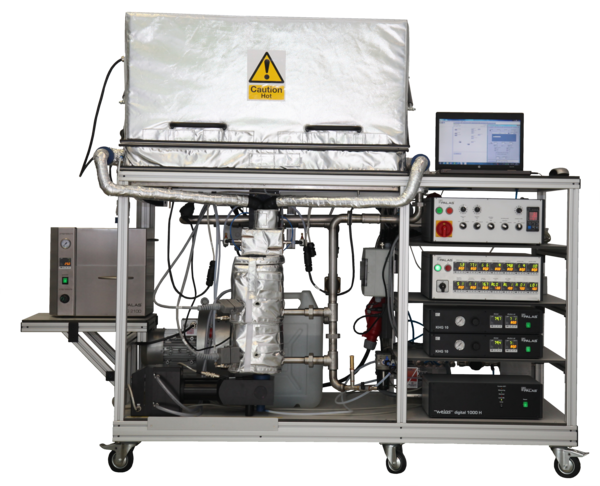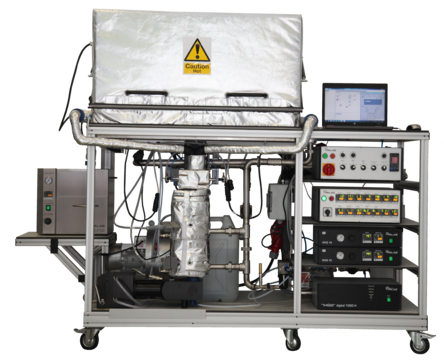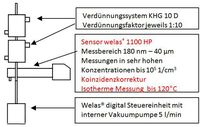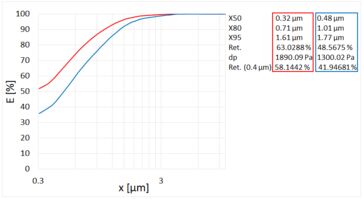HMT 1000 P

The quality control and development of separators should be preferably accomplished under practice-relevant test conditions. Oil separators must therefore be tested under the application conditions at high temperatures up to 120 °C and, depending on its application field, at high pressures.
As a unique feature, the HMT 1000 P version of the test rig offers the control of upstream absolute pressure to ± 200 mbar at the entrance of the test room or test filters.
With the modular testing system, HMT 1000 P oil separators can, e. g. for the separation of blow-by aerosols in combustion engines or the separation of oil vapour behind compressors, be characterized fast and precisely and, above all, be tested isothermally up to 120 °C in step with actual practice:
- Fractional separation efficiency
- Loading time/Lifetime
- Total separation efficiency/gravimetry
- Pressure drop
Norms and certificates
National and international standards
ISO 17536
Operation principle
Heatable modular testing system for oil nebulizers better as ISO 17536
The single components of the test rig like the high-resoluting heatable light-scattering spectrometer Promo® 1000 H, the heatable dilution systems KHG 10 D and the heatable aerosol generator PLG 2100 can be simply removed from the HMT 1000 and used for other applications, e. g. measurements directly on the engine. For many years numerous companies worldwide have benefited from the advantages of the heatable and pressure-resistant Palas® test components for the isothermal and isobaric particle size and particle quantity measurement of oil mists. Palas® HMT 1000 filter test rigs have been used with great success in the international industry since 2001.
The heart core of the HMT 1000 P is the light-scattering spectrometer Promo® 1000 H, which measures the particle size and particle number and thus the concentration simultaneously but independent from each other. With the Promo® 1000 H it can be measured extremely fast, clearly, reproducibly and isothermally (see data sheet Promo® 1000 H).
The usual gravimetric quantity determination is often not fast and sensitive enough and provides no information about the particle size distribution. Due to the extremely good correlation between number distribution measurement and gravimetry a fast and mass-relevant test of the oil separators is guaranteed. The determination of the clean gas concentration is possible within 1 minute by means of the Promo® 1000 H system.
Why isothermal measurement?
Depending on the temperature of the engine the particle sizes and concentrations change in the oil mist. Thus, oil separators must be tested at different temperatures, i. e. with different particle sizes (up to approx. 5-8 µm) and particle concentrations (approx. 105particles/cm3up to 107particles/cm3) as well as different volume flows in order to characterize them clearly regarding its separation behaviour. Modifications of the characteristics of the separator which are caused by e. g. the change of the volume flow, the temperature, the loading of the filter etc. must be clearly determined by a reliable online measurement or an in-situ measurement. In order to prevent condensation effects but also evaporation effects, the complete aerosol guidance with the HMT 1000 P including preparation, sampling and measuring volume is heatable up to 120 °C. Thus, an isothermal fractional separation efficiency determination is guaranteed.
Why regulation of ± 200 mbar?
Depending on the structure of the oil separator an over pressure or under pressure developes at the entrance of the filter. Because of the control of ± 200 mbar at the entrance of the test device oil mist separators can be tested under the same conditions as in practice.
Isothermal in-situ measurement, e. g. at the engine
The testing system HMT 1000 is built up movably and modularly. Thus, the single components can be used also for other tests and particle measurements, e. g. in-situ measurements at the engine.
Fig. 2: Isothermal sampling of particles and in-situ measurement
Automatic detection of the measuring data with the Palas® FTControl software
The practice-proven software allows an almost fully-automated characterization of oil separators. Thus, a result is independent of the user of the test rig (see data sheet FTControl).
Test rig control:
- Automated control of the volume flow
- Automated switch on of the aerosol generator
- Automatic switch between upstream/downstream measuring point
- Automatic temperature control
- Evaluation and registration of measuring signals as e. g. Δp, rel. humidity, temperature, volume flow, absolute pressure etc.
Automatic measuring process:
- Automatic evaluation of the pressure loss curve
- Automatic measurement of the fractional separation efficiency
- Automatic evaluation of the pressure loss curve at different loading conditions incl. measurement of the fractional separation efficiency
Fig. 3: Comparison of different oil separators
Benefits
Your special advantages
- Detection and evaluation of the fractional separation efficiency and loading
- Isothermal and isobaric measurement
- All components heatable up to 120 °C
- The inlet pressure at the test filter can be controlled in the range of ± 200 mbar
- High reproducibility of the test procedure
- Internationally comparable measuring results due to the wide distribution of the measuring system
- Cleaning and calibration can be accomplished by the customer himself
- Easy to handle, short training even of untrained staff
- Flexibility due to modular set-up
- Proof of the clear function of single components and the complete system during pre-acceptance and delivery
- Reliable function
- Short set-up times, extremely low maintenance
- Reduces your operating expenses
Applications
Individual solutions for various industries
- Quality assurance for oil separators
- New and further development of oil separators, e.g. coalescence separators, cyclonic separators and other inertia separators, electrofilters and filter combinations, e.g. for
- Blow-by aerosols
- Oil mist downstream of compressors
- Cooling lubricants on machine tools
- Aerosols for minimal quantity lubrication
Technical features
In detail
- Measurement range (number C_N)
- Up to 107 particles/cm3 with LDD100 H
- Measurement range (size)
- 0.18 – 40 µm
- Volume flow
1 – 25 Nm3/h, 1 – 85 Nm3/h (others on request)- Differential pressure measurement
- 0 – 5,000 Pa (others on request)
- Compressed air supply
- 6 – 8 bar
- Pressure
- 0.2 – 0.2 barg relative
- Dimensions
- Approx. 1,780 • 2,240 • 800 mm (H • W • D)


